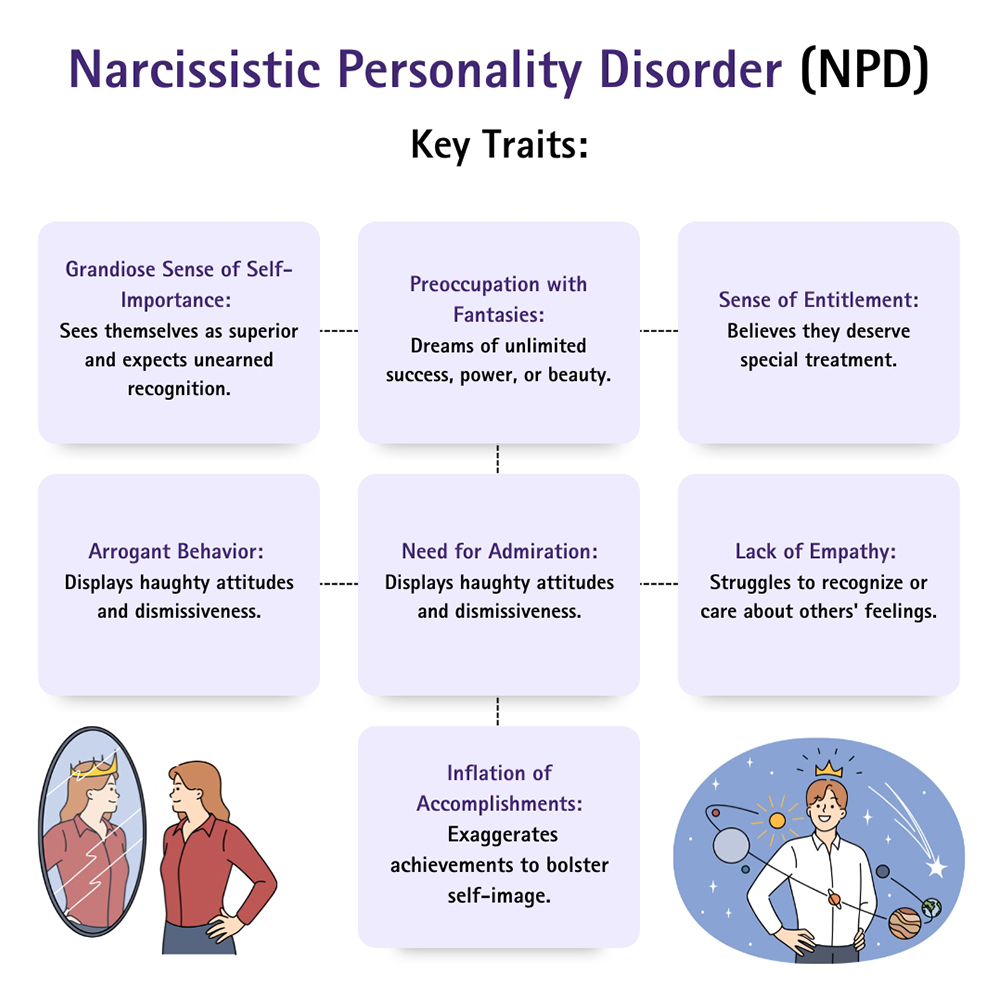Understanding Narcissistic Personality Disorder?

What is NPD?
Narcissistic personality disorder is a a cluster B personality disorder characterized by:
- Grandiose sense of self-importance
- Preoccupied with fantasies of unlimited success, power, brilliance, or beauty
- Sense of entitlement
- Arrogant behavior
- Need for admiration
- Lack of empathy
- Inflation of their accomplishments
Individuals with NPD often feel misunderstood and may seek validation from people of high status. It is important to them to be the “top” person at work, and they may put down people who disagree with them.
Although people with NPD have an inflated sense of grandiosity, their self-esteem is incredibly fragile. They have a deep concern about how they are viewed by others. They expect others to greet them with fanfare at their arrival, constantly fish for compliments, and use a great deal of charm.
These symptoms begin in early adulthood and persist throughout adulthood.
Symptoms may manifest differently in different people, and treatment plans will vary depending on individual differences.

Causes and Risk Factors
A combination of genetic and environmental factors are believed to cause narcissistic personality disorder, such as:
- Increased vulnerability to the condition if there is a family history of NPD or any other mental health disorder
- Childhood abuse
- Neglect
- Spoiling children
- Unrealistic expectations set by parents
NPD is diagnosed in adulthood, but the signs and symptoms can become noticeable in childhood. Children with conduct disorder, a behavioral disorder characterized by aggression, defiance, and rule-breaking, are at high risk of developing NPD.
According to research, approximately 0.5 to 5% of Americans have narcissistic personality disorder. However, the actual number may be higher because people with this diagnosis may be able to hide their symptoms and rarely seek therapy.
Recognize the Signs
Some signs to look out for include:
- Grandiose sense of self
- Feeling envious or judgmental of others
- Feeling as if no one understands them
- Sense of entitlement
- Obsession with power, beauty, and success
- Excessive need for admiration
These signs are indicators that can help you protect yourself. However, an assessment from a mental health professional is necessary for diagnosis.
Narcissistic Personality Disorder Treatment
Types of Therapy
The best types of therapy for narcissistic personality disorder include:
- Psychodynamic therapy: This form of therapy helps the client understand their unconscious thoughts. By understanding the childhood experiences that led to the development of NPD, these individuals can begin changing their behavior
- Cognitive behavioral therapy (CBT): Since NPD is caused by distorted beliefs about oneself, CBT can help individuals challenge their beliefs that lead to maladaptive behavior
- Schema therapy: This intervention can help people challenge their core beliefs about themselves and others.
- Dialectical behavioral therapy (DBT): DBT can help individuals manage their emotions, learn skills to tolerate distress, and improve their relationships with others.
- Interpersonal therapy (IPT): IPT can help individuals with NPD develop more realistic beliefs about themselves and improve their communication.
The best type of therapy depends on the individual and the therapist’s specialty. More important is the therapeutic relationship between client and therapist.
Goals of Therapy
The goals of therapy for NPD include:
- Develop empathy: Be able to identify and relate to other people’s emotions.
- Process thoughts and feelings: Understand yourself and your actions.
- Emotions regulation: Feeling and controlling emotions
- Improve relationships: Build healthier connections with others
The above are examples of therapy goals. You and your therapist will develop your own goals based on your needs and preferences.
The Therapeutic Process
NPD is diagnosed by a mental health professional such as a therapist, psychologist, or psychiatrist. The clinician will ask a series of questions regarding history, thoughts, feelings, and behaviors.
The mental health professional may also use a standardized questionnaire to ask questions and use the data to assess for a diagnosis.
The therapist may also use criteria from the Diagnostic and Statistical Manual to assess symptoms.
During your therapy, you and your counselor will build rapport by getting to know each other. The relationship between you and your therapist is crucial for progress in treatment. You can discuss your goals and needs for therapy. After building a foundation of trust, you will begin identifying patterns in your life and bringing awareness to their cause. You will learn specific tools for your problems.
Through CBT, you can learn to identify triggers for anger, manage anger through relaxation techniques, and, through this process, improve your relationships with others.
The Value of Inpatient Treatment for NPD and Co-occurring Conditions
The benefits of inpatient treatment for co-occurring mental health conditions include:
- Structured and supportive environment
- Intensive therapy and medication treatment
- Opportunity to challenge negative beliefs
- Clients can handle triggers and challenges with around-the-clock support
If you are interested in inpatient treatment, talk to your medical provider for assistance in identifying resources.
Finding a Therapist in West Palm Beach
Importance of Finding a Qualified Therapist
It is important to find a therapist who understands the nuances of NPD. This person should be someone you connect with and can trust. An NPD therapist must be empathetic and maintain confidentiality.
How to Find a Therapist
Some tips for finding a therapist for NPD include:
- Ask your doctor for a referral
- Search online for a therapist who specializes in NPD
- Contact your insurance company and ask for a list of therapists
- Attend a therapy consultation and ask about the counselor’s therapeutic approach
The best therapist is the one who you feel comfortable with and can trust.
For more information about our counselors or to schedule an appointment with a depression therapist, call the therapy center.
(561) 363-7994What to Expect in Therapy
You can expect the following in NPD therapy:
- Assessment: Your therapist will ask you some questions about your history.
- Build rapport: You and your counselor will build trust as you continue to process your thoughts, feelings, and behaviors.
- Develop a treatment plan: Your counselor will guide you in identifying goals and steps to achieve them.
- Learn new skills: During therapy, you will learn new tools to handle stressful situations.
It’s important to know that progress with NPD is not linear. The most important thing is to be honest with yourself and your therapist.
Additional Resources and Support
Some resources if you are in immediate need of support include:
- 988 Suicide & Crisis Lifeline: Call or text 988
- Crisis Text Line: Text HOME to 741741
- The Trevor Project: 1-866-488-7386
Remember to take care of yourself during the process of NPD recovery. Social support and coping skills are crucial in your recovery.
Our commitment to providing trustworthy and emotionally supportive resources for those seeking treatment for narcissistic personality disorder remains unwavering. We invite you to explore the wealth of information on our platform, from treatment options to the benefits of supportive therapy. Take the first step towards healing and personal growth by connecting with the resources and support you need today.

